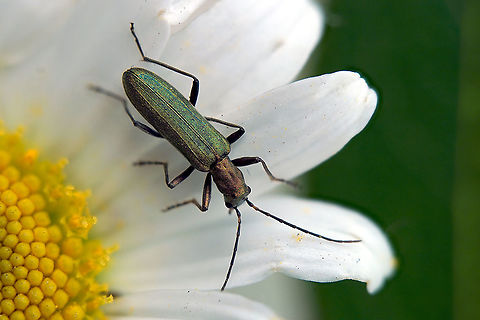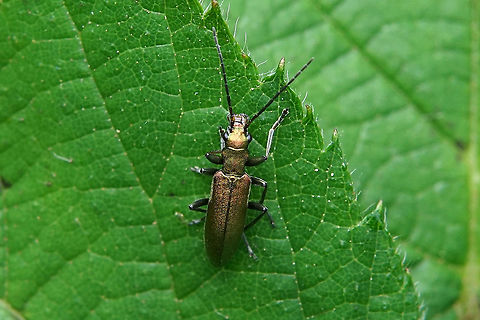
Appearance
''Chrysanthia viridissima'' can grow up to 7–10 millimetres long. These beetles have a soft and rather elongated bodies. The head is elongated. The mandibles are bifid. Antennae are long and filiform, composed by eleven segments. Pronotum is hearh-shaped. Elytra are densely punctured and have four longitudinal ribs. On the legs all pairs of coxae are enlarged. The legs and antennae are dark. Adults are metallic green , blue or coppery.This species is rather similar to ''Chrysanthia geniculata'', but they can be distinguished by the hair, the shape of the throat plate, the ribs on the elytra and the color.
Distribution
These quite common beetles are present in most of Europe and in East Palearctic ecozone , Finland, France, Germany, Greece, Hungary, Italy, Montenegro, Poland, Romania, Russia, Serbia, Slovakia, Slovenia, Spain, Sweden, Switzerland). These beetles inhabit flowery meadows and woodlands.Behavior
Adults are phytophagous. They can mostly be encountered from May through July feeding on pollen and nectar mainly of Apiaceae species, especially, ''Angelica sylvestris'' and ''Heracleum sphondylium'', but also on ''Cistus salviifolius'' and Achillea millefolium''. The larvae live inside roots or in dead wood, being ''xylophages''.Habitat
These quite common beetles are present in most of Europe and in East Palearctic ecozone , Finland, France, Germany, Greece, Hungary, Italy, Montenegro, Poland, Romania, Russia, Serbia, Slovakia, Slovenia, Spain, Sweden, Switzerland). These beetles inhabit flowery meadows and woodlands.References:
Some text fragments are auto parsed from Wikipedia.
